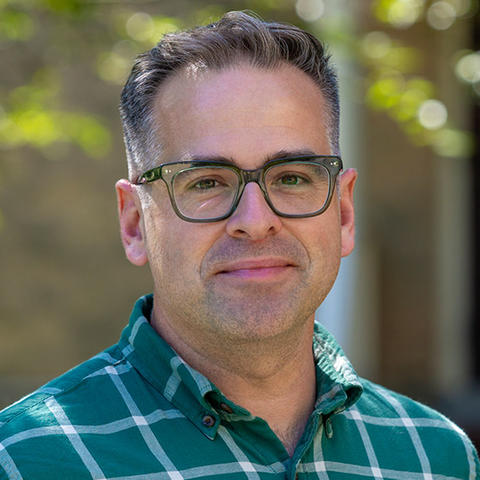Haverford Welcomes Six New Faculty Members

Clockwise, from top: RB McGee, Thao Nguyen, Vijay Singh, Gordon Peterson, Steve Ndengue, Paul Tran-Hoang. Photos by Patrick Montero.
Details
This year, new professors joined the departments of chemistry, computer science, mathematics, philosophy, and physics.
Reginald ‘RB’ McGee joins the Department of Mathematics and Statistics as an associate professor. McGee studies computational immunobiology to develop models and methods of data analysis to address questions of scientific and clinical interest. His interests lie in blood disorders, health disparities, signal transduction, immune responses, and autoimmune disorders. McGee received his Ph.D. and master’s in mathematics from Purdue University. His dissertation is titled “Modeling, analysis, and control of Syk-mediated signaling events and associated cellular response for B Cells.” He joins Haverford from the College of the Holy Cross in Worcester, Massachusetts, where he was an assistant professor of mathematics. McGee teaches “Calculus: Dynamics and Integration” this semester.
Steve A. Ndengué, an assistant professor in the Department of Physics and Astronomy, received his Ph.D. in Condensed Matter and Radiation Physics from Université Grenoble Alpes in Grenoble, France. With research focused on theoretical atomic and molecular physics as well as theoretical physical chemistry, his dissertation, titled “Photodissociation of Ozone: Isotopic Selectivity,” explores the role of photolysis in the anomalous composition of atmospheric ozone. Currently, his research interests are in the modeling and simulation of processes using quantum molecular dynamics for astrochemistry, atmospheric chemistry and catalysis applications. Prior to his arrival at Haverford, Ndengué was a visiting assistant professor at Trinity College in Hartford, Connecticut, and a scientific staff at the ICTP-East African Institute for Fundamental Research, a UNESCO Category II institute focused on research and development in Africa with an affiliation as a Senior Lecturer at the University of Rwanda. Ndengué currently teaches “Fundamental Physics II.”
An assistant professor in the Department of Computer Science, Thao Nguyen’s research is motivated by a desire to develop robotic assistants to help humans with their daily tasks in their homes and offices. Much of her work is focused on improving robots’ natural language and visual understanding for more effective interactions with humans and task completion. Nguyen received her Ph.D. and master’s in computer science from Brown University with a dissertation titled “Human-Guided Robot Object Search.” Prior to joining Haverford, Nguyen was a graduate research assistant, lead lecturer, and graduate teaching assistant at Brown. She was born and raised in Hanoi, Vietnam and attended Vassar College for her undergraduate studies. This semester, Nguyen teaches “Foundations of Data Science.”
Gordon Peterson's research explores the ways the crystalline structure of inorganic materials affects their physical properties by leveraging insights drawn from solid-state chemistry, materials science, physics, and computer science. Now an assistant professor in the Department of Chemistry, Peterson received his Ph.D. from the University of Wisconsin-Madison and was a postdoctoral fellow at the University of Houston and an Argonne scholar in Argonne National Laboratory’s material science division before joining Haverford. Peterson also taught introductory chemistry as an adjunct professor at Dominican University. This fall, he teaches “Chemical Structure and Bonding.”
Vijay Singh joins the Department of Physics and Astronomy as an assistant professor. Singh, who received his Ph.D. from Emory University, is interested in understanding signal processing in biological systems. To advance that knowledge, he develops theoretical and computational models to better understand how systems like cellular/receptor networks process chemical signals. He also explores visual color perception in humans and has previously worked on phase transitions in complex hierarchical networks. Singh joins Haverford from North Carolina Agricultural and Technical State University, where he was an assistant professor of physics. This semester, Singh teaches “Classical and Modern Physics I.”
Assistant Professor Paul Anh Tran-Hoang researches logic, the philosophy of logic, and the philosophy of mathematics. Much of his work explores the nature of translation, equivalence, and reduction, which runs alongside his serious research interests in the philosophy of science and the history of 19th- and 20th-century philosophy. Tran-Hoang is also passionate about prison education and translating Vietnamese poetry. He joins the Department of Philosophy after receiving his Ph.D. from the University of Notre Dame, where he also completed his master’s in philosophy and mathematics. This semester, Tran-Hoang teaches “Historical Introduction to Logic.”




